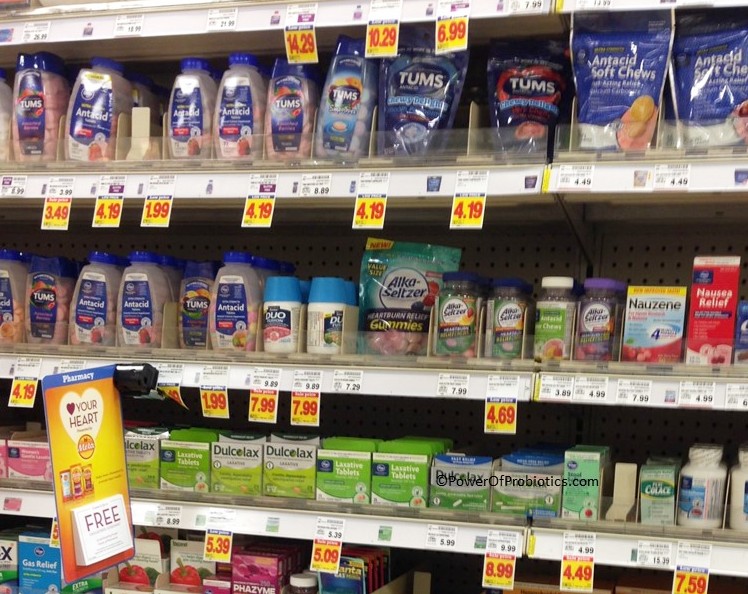Indigestion: Can Probiotics Help?
 |
Do you need help with indigestion? Lots of people do, as evidenced by the number of over-the-counter medications to deal with the symptoms. Bloating, burping, heartburn, gas, queasiness, nausea and an uncomfortable feeling of fullness in your stomach/upper abdominal area are signs of problems in your digestive tract. |
Indigestion literally means “not digestion”. Something(s) along the way in your 30-foot long gastrointestinal (GI) tract is/are not working properly. Sometimes it is called maldigestion or dyspepsia. If you were diagnosed with dyspepsia, or you think you have it, please understand that it is not a diagnosis in itself.
Overview of How Digestion Is Supposed to Work
As you can imagine, your body is designed to be able to digest food. At times there may be genetic, structural or other medical reasons why digestion is not working properly, but for the most part, unhealthy eating habits - things you are doing or taking, or not doing or not taking - are the underlying causes of your dyspepsia.
When you eat, you are supposed to chew your food thoroughly until it is a mushy liquid before swallowing. Doing so allows your teeth to mash the food into manageable bits so that enzymes in your saliva and microbes in your mouth can begin to break it down. How many times do you wolf down your food, drinking something to wash it down, to get on with “more important things?”
Once you swallow, your oral digestive enzymes continue to work for a short while until your stomach acid inactivates them and gastric enzymes and the churning of muscle contractions take over. (Yes, there is a reason you have stomach acid and neutralizing it with antacids or preventing it from forming with acid blockers is killing that reason!)
After your stomach is finished doing its job, the food, now called chyme, enters your small intestine where brush-border enzymes, buffers, pancreatic enzymes and microbes take over. The motion of peristalsis moves the chyme through your small intestine while nutrients are absorbed along the way. Bacteria and yeasts in the small (and large) intestine also help break down the chyme and produce substances to nourish and protect your intestinal cells, provide nutrients for your body, and keep your intestines healthy. By the time the food you ate enters your large intestine, the majority of nutrients are absorbed and stool is formed. Most of the microbes in your gut are in your large intestine, so they ferment and further break down any remaining salvageable parts of the food. Once the large intestine is finished with the stool, you eliminate it through bowel movements.
Any problem anywhere along that digestive route can result in dyspepsia. It could be that you do have a genetic, structural or medical problem. But it also could be that you ate too much for your stomach to handle at once, so your stomach is stretched, activating pain receptors and causing discomfort. It could be that you didn’t chew your food, or you don’t have enough stomach acid or digestive substances. Perhaps your gut motility is slow, you cannot absorb what you ate, or you are sensitive to the food you ate. There are many reasons.
While there are numerous reasons why you may be having indigestion, realize that it in itself is not a diagnosis. Instead, it is a cry for help from your body. Repeat dyspepsia is a warning that something is not working properly, and instead of taking antacids and other medications to mask the symptoms, figure out why it is happening.
A Big Reason for Indigestion
One of the reasons for your dyspepsia can be dysbiosis, a disruption in healthy proportions of microbes in the GI tract. Postprandial is a word which means “after a meal.” Two recent studies highlight how postprandial fullness and other dyspepsia symptoms may indicate dysbiosis.
A January, 2017 study showed that when people with diagnosed functional dyspepsia were given rifaximin, an antibiotic which is not easily absorbed, global dyspeptic symptoms, belching and post-prandial fullness/bloating improved. Rifaximin is often used for pathogen control in IBS, diarrhea and other GI complaints.
A February, 2017 study showed that patients with postprandial fullness syndrome have a higher risk of IBS, particularly constipation-dominant IBS. IBS is often related to an imbalance of microbes in the small intestine.
Probiotics for Indigestion
One thing that can affect nearly every aforementioned symptom of dyspepsia is a disrupted gut microbiome. That is something that antacids, H2 blockers and proton-pump inhibitors (PPI's) cannot help. Probiotics of many types may be able to help correct the causes by re-balancing the gut microbiome, thereby improving stomach function, improving food breakdown and absorption, regulating gut motility, or preventing leaky gut and food sensitivity consequences.
Remember that probiotics work best in prevention, and prevention is the key to alleviation of GI problems. At times, taking probiotics when you are feeling uncomfortable symptoms can with the cause, but probiotics work best when used preventively.
Need Help with Indigestion?
If you are practicing healthy eating habits and still have problems with bloating, burping, heartburn, gas, queasiness, nausea and an uncomfortable feeling of fullness in your stomach/upper abdominal area, nutritional consultations with me can help you get to the root cause(s) of your digestive issues and help your body’s digestive system work the way it is intended to work.
Return to Health Benefits page.
Return to Homepage.
I research studies and share my clinical experience to write this free site to help you find solutions to your problems. As part of that, I recommend products and services that I genuinely believe will be of help to you. If you click on a link to a product/service, I may receive a small commission to support my efforts if you buy something. The item does not cost you more.
Thanks for visiting this site! If you've enjoyed reading this page or have found the information to be useful to you, please "like", tweet about it, or share it so others can benefit, too. You can leave comments below via Facebook or Disqus.
Comment with Disqus (including as a guest), Twitter or Google accounts:
If you are one of my many readers without a Facebook account, you can still comment.
Disclaimer: Please note: By law, I cannot provide any personalized recommendations for your specific health concern on this site. The information contained in this site is educational in nature and is not intended as diagnosis, treatment, prescription or cure for any physical or mental disease, nor is it intended as a substitute for regular medical care. Consult with your doctor regarding any health or medical concerns you may have.
Subscribe to my occasional newsletter and receive a free copy of "How to Use Probiotics to Lose Weight and Be Healthier".

To comply with the EU's GDPR data privacy regulation, please subscribe here:
Looking for some quality professional supplements, including probiotics? Check out my online dispensary, as I will be doing reviews of some of these products in the future. Click on the Fullscript picture. (Note: If you were a former Wellevate customer, please switch to Fullscript for a better customer experience. Thanks!)
Some competitors of SBI (Solo Build It) are posting fake negative reviews of SBI. If you are considering creating your own website business, or if you have a brick-and-mortar business but want an online presence, I highly recommend SBI!





Comment with Facebook!
I'd love to hear your opinion about what you just read. Leave me a comment in the box below! Other commenting options follow the Facebook comments.